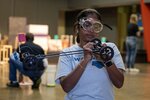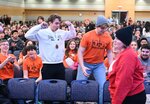RIVER FALLS – Avantika Sivakumar held a mini-car in her hands and turned the back wheels one rotation after another according to a predetermined calculation that would determine how far the …
This item is available in full to subscribers.
To continue reading, you will need to either log in, using the login form, below, or purchase a new subscription.
If you are a current print subscriber, you can set up a free website account and connect your subscription to it by clicking here.
Otherwise, click here to view your options for subscribing.
Please log in to continue |


RIVER FALLS – Avantika Sivakumar held a mini-car in her hands and turned the back wheels one rotation after another according to a predetermined calculation that would determine how far the vehicle would travel when pushed forward by a weight-propulsion system.
“Eight, nine, ten,” Sivakumar, a senior at Wayzata, Minn., High School, counted as her teammate and senior classmate, Raghav Goel, double-checked the wooden weight attached to a string of a certain length that would send the car forward. He taped an egg to the vehicle’s front, a factor that gave the event its “Scrambler” title.
A moment later Sivakumar pulled the string, the weight dropped, and the car sped forward about 40 feet, stopping a short distance from a small wall. A collision would have broken the egg.
“That was good!” Sivakumar told Goel. “Good work. Now let’s see if we can get the car even closer (to the wall).”
Sivakumar and Goel were among about 900 high school students from across the Midwest who spent Saturday participating in science-related activities and competitions of all sorts as part of the Science Olympiad at the University of Wisconsin-River Falls. The event marked the 12th Science Olympiad the university has hosted since the event was begun by UW-River Falls emeritus physics professor Earl Blodgett.
Sivakumar’s and Goel’s team was one of 58 taking part in an array of activities with such titles as mystery architecture, virtual geocaching, disease detectives and robot tour. Students could participate in any of 27 different activities, all of them based on science in its many different forms and applications.
Science Olympiad is an international nonprofit organization created in 1984 to improve the quality of science education by increasing student interest and recognizing outstanding scientific achievement. Science Olympiad tournaments like the one at UW-River Falls are regional competitions. Qualifiers at those events qualify for state and national events.
“With the variety of event categories, we hope there is something for everyone here,” said Jamie Schneider, assistant dean of the College of Arts and Sciences and a chemistry professor who directed the Science Olympiad for the first time this year.
Schneider noted students’ enthusiasm about the event, saying she was pleased to see “a lot of smiling and laughing going on.” Those positive vibes were despite the fact that the event is designed to be especially challenging, at the level of difficult college science courses.
“How many people show up on a cold Saturday like this, excited to tax their brains and talk about science in an exciting way?” Schneider said. “You can’t help but be impressed by these students.”
Katie Marano, a junior at UW-River Falls majoring in geology/earth science, was similarly impressed. One of many Science Olympiad volunteers, as she watched students participate, she reflected on her experience at the event when she was a senior at New Richmond High School.
After high school graduation, Marano attended the University of Minnesota-Twin Cities. When she decided to change schools, she remembered her positive experience at UW-River Falls at the Science Olympiad. Today she is thankful she found her way to the school.
“I remembered my time at Science Olympiad and that led me to come to UW-River Falls,” Marano recalled. “I knew the science programs here (at UW-River Falls) were really strong. I decided to come here, and it has worked out great for me.”
Just like she did, Science Olympiad participants learn from the challenges the event presents, Marano said. That was the case for Will Engle and Jon Madison, sophomores at Boyceville High School, as they participated in the “Scrambler” event. Despite their meticulous calculations, their vehicle didn’t perform the way they had planned.
“It was OK, but we were a little bit off. We could have done a little better,” Engel said. “But that is how science is. You measure your results and you’re constantly learning from what does and doesn’t work.”
Sivakumar and Goel had a similar experience. After their car’s first trip toward the wall, Sivakumar wound its back wheels one extra turn to bring it just to the edge of the wall. But it didn’t turn out that way, instead stopping even shorter than on the vehicle’s first trip.
“Maybe it was the angle of the string when I pulled it,” Sivakumar said afterward. “That’s the fun of science, figuring out what factors are at play and figuring out how to do it better. This event is a great way to help us do that.”
Submitted by UW-River Falls